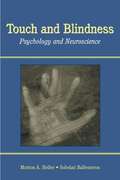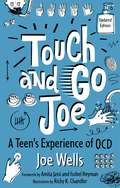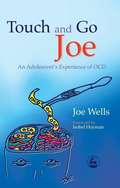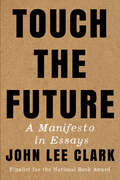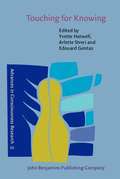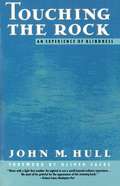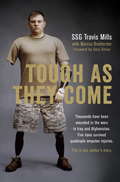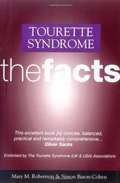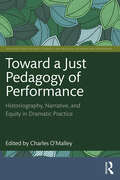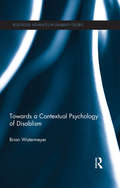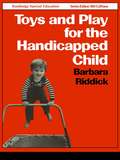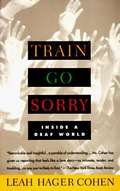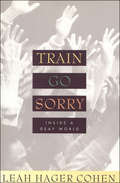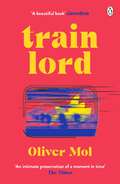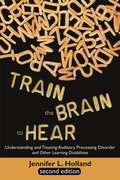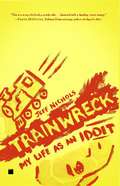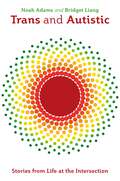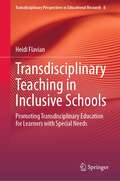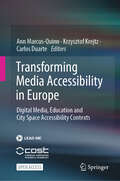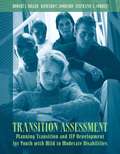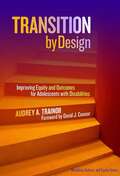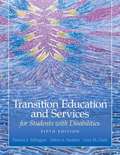- Table View
- List View
Touch and Blindness: Psychology and Neuroscience
by Morton A. Heller Soledad BallesterosThis is a scholarly document concerning the neurological aspects of visual impairment.
Touch and Go Joe, Updated Edition: A Teen's Experience of OCD
by Joe WellsIn this down-to-earth, fun and empowering book, Joe Wells talks about his teenage experience of OCD and all the coping mechanisms and treatment options that have worked for him. It's packed full of brilliant, honest advice for others struggling with this disorder, written by someone who understands what it's like to be a teen with OCD. This updated edition with all-new illustrations includes a brand-new chapter written 16 years later, detailing how Joe overcame his disorder and is now a successful comedian.
Touch and Go Joe: An Adolescent's Experience of OCD
by Joe WellsPart of the Reading Well scheme. 35 books selected by young people and health professionals to provide 13 to 18 year olds with high-quality support, information and advice about common mental health issues and related conditions. As many as 2 in every 100 people suffer from Obsessive-Compulsive Disorder (OCD), and 16-year-old Joe Wells is one of them. In Touch and Go Joe, he tells the story of his battle with OCD from its insidious beginnings at age 9 and increasingly intrusive symptoms, to diagnosis at age 12. Having struggled to keep the condition a secret for years, he is now able to talk and write openly about OCD and how he battled to overcome it. This book is packed with advice and coping strategies, as well as first-hand accounts of available treatments such as cognitive behavioural therapy and medication. Written in an informal and accessible style, and including his own humorous illustrations, Touch and Go Joe gives an upbeat yet realistic look at the effect of OCD on adolescent life. This honest and amusing account will raise awareness of this all-too-common, yet frequently misdiagnosed disorder and will be of interest to anyone who has suffered from or knows someone who has suffered from OCD, including children and adolescents, teachers, psychologists, psychiatrists, mental health professionals, parents and carers.
Touch the Future: A Manifesto in Essays
by John Lee ClarkA revelatory collection of essays on the DeafBlind experience and the untapped potential of a new tactile language. Born Deaf into an ASL-speaking family and blind by adolescence, John Lee Clark learned to embrace the possibilities of his tactile world. He is on the frontlines of the Protactile movement, which gave birth to an unprecedented language and way of life based on physical connection. In a series of paradigm-shifting essays, Clark reports on seismic developments within the DeafBlind community and challenges the limitations of sighted and hearing norms. In "Against Access," he interrogates the prevailing advocacy for "accessibility" that re-creates a shadow of a hearing-sighted experience, and in "Tactile Art," he describes his relationship to visual art and breathtaking encounters with tactile sculpture. He offers a brief history of the term "DeafBlind," distills societal discrimination against DeafBlind people into "Distantism," sheds light on the riches of online community, and advocates for "Co-Navigation," a new way of exploring the world together without a traditional guide. Touch the Future brims with passion, energy, humor, and imagination as Clark takes us by the hand and welcomes us into the exciting landscape of Protactile communication. A distinct language of taps, signs, and reciprocal contact, Protactile emerged from the inadequacies of ASL—a visual language even when pressed into someone’s hand—with the power to upend centuries of DeafBlind isolation. As warm and witty as he is radical and inspiring, Clark encourages us—disabled and non-disabled alike—to reject stigma and discover the ways we are connected. Touch the Future is a dynamic appeal to rethink the meanings of disability, access, language, and inclusivity, and to reach for a future we can create together.
Touched by Jesus' Love: The 75th Anniversary Anthology of the Lutheran Blind Mission
by Rodney RynearsonThe anthology of religious poetry and prose about blindness for the 75th Anniversary of The Lutheran Braille Library for the Blind.
Touching for Knowing
by Yvette Hatwell Arlette Streri Edouard GentazA number of articles exploring ways people learn. Learning through touch instead of vision is contrasted.
Touching the Rock: An Experience of Blindness
by John M. HullThis calmly eloquent, deeply perceptive memoir of a writer and theologian who lost his vision in his mid-forties conveys the unimaginable and ushers its readers into the world of blindness--a world in which the faces of loved ones recede into memory or speculation, while the presence of God becomes supremely important.
Tough As They Come
by Marcus Brotherton Gary Sinise Travis MillsThousands have been wounded in the wars in Iraq and Afghanistan. Five have survived quadruple amputee injuries. This is one soldier's story. Thousands of soldiers die year to defend their country. United States Army Staff Sergeant Travis Mills was sure that he would become another statistic when, during his third tour of duty in Afghanistan, he was caught in an IED blast four days before his twenty-fifth birthday. Against the odds, he lived, but at a severe cost--Travis became one of only five soldiers from the wars in Afghanistan and Iraq to survive a quadruple amputation. Suddenly forced to reconcile with the fact that he no longer had arms or legs, Travis was faced with a future drastically different from the one he had imagined for himself. He would never again be able to lead his squad, stroke his fingers against his wife's cheek, or pick up his infant daughter. Travis struggled through the painful and anxious days of rehabilitation so that he could regain the strength to live his life to the fullest. With enormous willpower and endurance, the unconditional love of his family, and a generous amount of faith, Travis shocked everyone with his remarkable recovery. Even without limbs, he still swims, dances with his wife, rides mountain bikes, and drives his daughter to school. Travis inspires thousands every day with his remarkable journey. He doesn't want to be thought of as wounded. "I'm just a man with scars," he says, "living life to the fullest and best I know how."From the Hardcover edition.
Tough As They Come
by Marcus Brotherton Gary Sinise Travis MillsThousands have been wounded in the wars in Iraq and Afghanistan. Five have survived quadruple amputee injuries. This is one soldier's story. Thousands of soldiers die year to defend their country. United States Army Staff Sergeant Travis Mills was sure that he would become another statistic when, during his third tour of duty in Afghanistan, he was caught in an IED blast four days before his twenty-fifth birthday. Against the odds, he lived, but at a severe cost--Travis became one of only five soldiers from the wars in Afghanistan and Iraq to survive a quadruple amputation. Suddenly forced to reconcile with the fact that he no longer had arms or legs, Travis was faced with a future drastically different from the one he had imagined for himself. He would never again be able to lead his squad, stroke his fingers against his wife's cheek, or pick up his infant daughter. Travis struggled through the painful and anxious days of rehabilitation so that he could regain the strength to live his life to the fullest. With enormous willpower and endurance, the unconditional love of his family, and a generous amount of faith, Travis shocked everyone with his remarkable recovery. Even without limbs, he still swims, dances with his wife, rides mountain bikes, and drives his daughter to school. Travis inspires thousands every day with his remarkable journey. He doesn't want to be thought of as wounded. "I'm just a man with scars," he says, "living life to the fullest and best I know how."From the Hardcover edition.
Tourette's Syndrome: The Facts
by Mary M. Robertson Simon Baron-CohenGilles de la Tourette's syndrome (or Tourettes syndrome) is an inherited neuropsychiatric disorder affecting five people inn every 10,000. It is characterized by multiple verbal and motor tic, which occur in bouts many times each day. These can be mild in some cases, but can reach a disabling extent in some sufferers, and can include some upsetting and anti-social behavior, such as involuntary swearing and obscene gestures in others. This book, written by a physiologist and a psychiatrist, who have been researching Tourette's syndrome for many years, explains the causes of the syndrome, how it is diagnosed, and the ways in which it can be treated. It includes a section providing clear answers to some of the most commonly asked questions about the disorder and another chapter devoted to coping strategies for close relatives of people diagnosed as having Tourette's syndrome.
Toward A Just Pedagogy Of Performance: Historiography, Narrative, And Equity In Dramatic Practice (Routledge Series in Equity, Diversity, and Inclusion in Theatre and Performance)
by Charles O’MalleyThis book is a compendium of resources largely by and for artists and scholars interested in engaging in conversations of justice, diversity, and historiography in the fields of theatre and performance studies. For these students, and for the future instructors in our field who will use this book, we hold a tripartite hope: to expand, to enable, and to provide access. In its whole, we intend for this book to provoke its readers to question the narratives of history that they’ve received (and that they may promulgate) in their artistic and scholarly work. We aim to question methods and ethics of reading present in the western mode of studying drama and performance history. The contributions in the book—not traditional chapters, but manifestos, experiences, articles, conversations, and provocations—raise questions and illuminate gaps, and they do not speak in a unified voice or from a static position. These pieces are written by artists, graduate students, teachers, administrators, and undergraduates; these are expressions of hope and of experience, and not of dogma. This book is aimed toward instructors of undergraduates, both graduate students and faculty at all levels of seniority within theatre and performance studies, as well as at artists and practitioners of the art that wish to find more just ways of viewing history.
Toward Independence: The Use of Instructional Objective in Teaching Daily Living Skills to the Blind
by Anne YeadonThis book is an introduction to the use of instructional objectives in the teaching of severely visually impaired persons. While it happens to use a daily living skills course as an example of how a teacher might develop a course around this educational method, it is not a daily living skills teaching manual. A creative teacher should be able to adapt the approach as described in Toward Independence to many other subjects.
Towards a Contextual Psychology of Disablism (Routledge Advances in Disability Studies)
by Brian WatermeyerIn recent years, disability studies has been driven by a model of disability which focuses on the social and economic oppression of disabled people. Although an important counterbalance to a pathologising medical model, the social model risks presenting an impoverished and disembodied view of disability, one that ignores the psychological nature of oppression and its effects. This innovative work argues that a psychological framework of disability is an essential part of developing a more cohesive disability movement. Brian Watermeyer introduces a new, integrative approach, using psychoanalysis to tackle the problem of conceptualising psychological aspects of life with disablism. Psychoanalytic ideas are applied to social responses to impairment, making sense of discrimination in its many forms, as well as problems in disability politics and research. The perspective explores individual psychological experience, whilst retaining a rigorous critique of social forces of oppression. The argument shows how it is possible to theorise the psychological processes and impressions of discriminatory society without pathologising disadvantaged individuals. Drawing on sociology, social anthropology, psychology and psychoanalysis - as well as clinical material - Towards a Contextual Psychology of Disablism shapes a view of disabled subjectivity which is embodied, internal, and political. Presenting a range of conceptual ideas which describe psychological dynamics and predicaments confronting disabled people in an exclusionary and prejudiced world, this volume is an important new contribution to the literature. It will interest students and researchers of disability studies, including those working within psychology, education, health and social work.
Toys and Play for the Handicapped Child
by Barbara RiddickFirst published in 1982. Routledge is an imprint of Taylor & Francis, an informa company.
Train Go Sorry: Inside a Deaf World
by Leah Hager CohenThis portrait of New York's Lexington School for the Deaf is not just a work of journalism. It is also a memoir, since Leah Hager Cohen grew up on the school's campus and her father is its superintendent. As a hearing person raised among the deaf, Cohen appreciates both the intimate textures of that silent world and the gulf that separates it from our own.
Train Go Sorry: Inside a Deaf World
by Leah Hager CohenA &“remarkable and insightful&” look inside a New York City school for the deaf, blending memoir and history (The New York Times Book Review). Leah Hager Cohen is part of the hearing world, but grew up among the deaf community. Her Russian-born grandfather had been deaf—a fact hidden by his parents as they took him through Ellis Island—and her father served as superintendent at the Lexington School for the Deaf in Queens. Young Leah was in the minority, surrounded by deaf culture, and sometimes felt like she was missing the boat—or in the American Sign Language term, &“train go sorry.&” Here, the award-winning writer looks back on this experience and also explores a pivotal moment in deaf history, when scientific advances and cultural attitudes began to shift and collide—in a unique mix of journalistic reporting and personal memoir that is &“a must-read&” (Chicago Sun-Times). &“The history of the Lexington School for the Deaf, the oldest school of its kind in the nation, comes alive with Cohen&’s vivid descriptions of its students and administrators. The author, who grew up at the school, follows the real-life events of Sofia, a Russian immigrant, and James, a member of a poor family in the Bronx, as well as members of her own family both past and present who are intimately associated with the school. Cohen takes special pride in representing the views of the deaf community—which are sometimes strongly divided—in such issues as American Sign Language (ASL) vs. oralism, hearing aids vs. cochlear implants, and mainstreaming vs. special education. The author&’s lively narrative includes numerous conversations translated from ASL . . . a one-of-a-kind book.&” —Library Journal &“Throughout the book, Cohen focuses on two students whose Russian and African American roots exemplify the school&’s increasingly diverse population . . . beautifully written.&” —Booklist
Train Lord: The Astonishing True Story of One Man's Journey to Getting His Life Back On Track
by Oliver MolThe astonishing true story of trust, pain, becoming lost, and finding a way back to yourself despite it all'An intimate preservation of a moment in time, full of personality' THE TIMES__________Life is beautiful - even in the dark . . .Oliver Mol was happily drifting through his twenties when the migraine exploded in his head.Suddenly, he could barely function. He felt marooned. Nothing helped. Yet he was desperate to save himself.Then he found the trains. The job of train guard has intense moments of strict, regimented activity in between periods of calm serenity. It was just what Oliver needed. Not only could he do this, but also it might be a way out.Train Lord is the story of Oliver's extraordinary recovery. A journey back into the light . . .__________'Tender, vital and quietly hopeful: a tale of remaking' Guardian'Rude, raw, visceral, painful and wildly funny' Saga 'Intense and humble, Train Lord won my heart' Australian Book Review
Train the Brain to Hear: Understanding and Treating Auditory Processing Disorder, Dyslexia, Dysgraphia, Dyspraxia, Short Term Memory, Executive Function, Comprehension, and ADD/ADHD (Second Edition)
by Jennifer HollandTrain the Brain to Hear was written by a parent and teacher for parents and teachers. The book provides explanations of the learning disabilities dysgraphia, dyslexia, dyscalculia, dyslexia and auditory processing disorder as well as the common areas that are affected by learning disabilities including short term memory, executive function and comprehension. The treatment program utilizes brain training and neuroplasticity techniques to encourage development of the connections in the brain that strengthen these skills. The techniques can also be used to work with those who have been diagnosed with ADD/ADHD, traumatic brain injury or stroke. One of the most difficult things for a parent to hear is that there is something wrong with a child and that there is nothing that can be done to help him. That is what author Jennifer Holland and her husband Charles were told in 2001 when their oldest son was diagnosed with auditory processing disorder. This diagnosis was repeated in 2010 when their second son was diagnosed and again in 2013 when the diagnosis was confirmed in their fourth child. In Charles and Jennifer’s family, auditory processing disorder is a genetic condition inherited from Charles. Jennifer made it her mission to figure out how to help her own children succeed in the classroom and in life. This program will allow you to treat those who are learning disabled from the preschool and early reader age level through adulthood and understand and address many of the most common difficulties they face in everyday life. This book was written and the program developed for every parent who has been told there was nothing that could be done for their child and for every parent/teacher who knows more can be.
Trainwreck: My Life as an Idoit
by Jeff NicholsGrowing up a privileged Manhattan kid, Jeff Nichols should have had it all. Instead, he got a plethora of impairments: learning disabilities, a speech impediment, dyslexia, ADD, and a mild case of Tourette's syndrome. In Trainwreck, his weird and witty memoir of utter dysfunction, Nichols gives an irreverent look at how one "idoit" made good. Bounced from elite private schools, he limps through college, earning the nickname "Iron Lung" for his uncanny ability to inhale from a four-foot bong without coughing. By the skin of his teeth, he graduates and lands a job on Wall Street...as a moving target for coked-up traders tossing order cards at his head. Bumming money from his parents to pay for drugs and prostitutes, Nichols hits bottom before he discovers Alcoholics Anonymous, the perfect place to develop material for his new career in stand-up. Several disastrous twists and turns later, he finally makes good when a crazy stroke of luck leads to his story being turned into a feature film by the same production company behind indie hits like Eternal Sunshine of the Spotless Mind and The Savages. Hilarious and oddly inspiring, Trainwreck is proof that a life disastrously lived can still turn out beyond anybody's wildest imaginings.
Trans and Autistic: Stories from Life at the Intersection
by Noah Adams Bridget LiangThis ground-breaking book foregrounds the voices of autistic trans people as they speak candidly about how their autism and gender identity intersects and the impact this has on their life.Drawing upon a wealth of interviews with transgender people on the autism spectrum, the book explores experiences of coming out, with self-discovery, healthcare, family, work, religion and community support, to help dispel common misunderstandings around gender identity and autism, whilst allowing autistic trans people to see their own neurodiverse experiences reflected in these interviews.An incisive introduction clearly sets out up-to-date research and thinking, before each chapter draws together key findings from the interviews, along with advice and support for those providing support to autistic trans individuals. Both accessible and authoritative, Trans and Autistic is an essential publication for autistic trans people, their families, and professionals wanting to understand and support their clients better.
Transdisciplinary Teaching in Inclusive Schools: Promoting Transdisciplinary Education for Learners with Special Needs (Transdisciplinary Perspectives in Educational Research #8)
by Heidi FlavianThis book offers opportunities for better understanding teachers’ unique challenges when planning teaching sessions for learners with special needs, based on the transdisciplinary approach. The work also presents some of the core learning strategies teachers may incorporate into their teaching processes in order to promote transdisciplinary learning among learners with special needs.From a theoretical perspective, this book discusses a variety of advantages and disadvantages transdisciplinary educators may encounter, and promotes educators' development of their own vision of this area. Although the concept of special needs is often over-generalized, this book relates to the most common types of special needs among learners who study in inclusive schools: learners from different cultural background, learners with Attention Deficit Hyperactive Disability (ADHD), learners with Autism Spectrum Disorder (ASD), and learners with sensory or motor challenges. A special chapter is dedicatedto each of those groups in order to closely examine how teachers can teach those learners according to the transdisciplinary approach in practice, in inclusive classrooms. While each chapter presents different perspectives of learners with special needs, the book’s summary integrates them all and highlights the commonalities between the various needs.
Transforming Media Accessibility in Europe: Digital Media, Education and City Space Accessibility Contexts
by Carlos Duarte Ann Marcus-Quinn Krzysztof KrejtzIn a rapidly evolving digital landscape, accessibility in media has emerged as a crucial frontier for inclusion, equality, and knowledge democracy. The present edited volume "Transforming Media Accessibility in Europe: Digital Media, Education and City Space Accessibility Contexts" is a comprehensive exploration of technological, societal, psychological, and legal aspects of media accessibility in Europe. It offers a comprehensive roadmap for navigating the multifaceted landscape of media accessibility. Through compelling experimental studies, case studies, and forward-looking insights, it elucidates the transformative potential of accessible media across diverse sectors, including education, culture, and smart cities. Crafted as a collaborative effort under the COST (European Cooperation in Science and Technology) LEAD-ME Action (CA19142), this book unites the expertise of researchers, educators, and practitioners. This is an open access publication.
Transition Assessment: Planning Transition and IEP Development for Youth with Mild to Moderate Disabilities
by Robert J. Miller Stephanie A. Corbey Richard C. LombardA practical, “hands on” book designed to provide the reader with a comprehensive understanding of how to use assessment information to develop transition plans. <P><P>Extremely practical and comprehensive, this new text demonstrates how to use transition assessment information to plan and design IEP goals and objectives. Theory, practice and application are tied together to develop the readers knowledge and skill in transition assessment. As such, the reader is provided with what to assess as well as how to assess. Finally, the book is structured to allow the reader to practice and demonstrate their understanding of transition assessment. <P><P>The text provides students with a model of transition assessment and several criterion referenced assessment instruments useful in student assessment. Plus, a chapter dedicated to each component of a holistic transition assessment model that helps students practice what and how to assess.
Transition By Design: Improving Equity And Outcomes For Adolescents With Disabilities (Disability, Culture, And Equity Ser.)
by David J. Connor Alfredo J. Artiles Audrey A. Trainor Elizabeth B. KozleskiTransitions to adulthood for adolescents with disabilities are as diverse as the adolescents themselves. While there have been marked improvements for students with disabilities, there is still concern that employment education and independent living outcomes are not equitable across groups of students. For example, adolescents of color are more likely to face exclusionary discipline procedures in school resulting in detention and court involvement which, in turn, can limit access to educational opportunities in inclusive settings. Recommending a shift toward strengths-based approaches to research and practice, Trainor explores how all stakeholders, including researchers and practitioners, can help shape equitable opportunities for youth with disabilities in transition. Transition by Design reframes disability, diversity, and equity during the transition from high school to adulthood.
Transition Education and Services for Students with Disabilities (Fifth Edition)
by Patricia L. Sitlington Gary M. Clark Debra A. NeubertThis book covers the transition of individuals with mild to severe disabilities from a school-age program to all aspects of adult life. The text addresses not only the transition of students with disabilities to employment, but also the transition to future living and post-secondary educational environments. Self-determination, interpersonal, and community integration knowledge and skills are integrated throughout. Transition Education and Services for Students with Disabilities builds upon the success of past editions and continues to expand content to include students with severe disabilities and students at the elementary and middle school levels. This text addresses the ideal and the real in terms of the relationship of the field of transition education and services to the standards-based reform movement in education. This book is intended for use by those in pre-service education programs at the undergraduate and graduate level, as well as those currently teaching in secondary special education programs and/or providing transition education and services.
